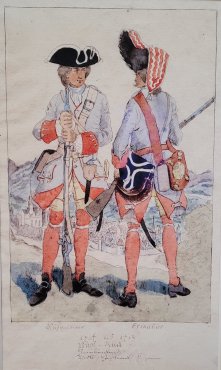Mercenaries from Chur
Even in the 19th century, the country struggled to feed its population. The need of the people led to the fact that some put themselves as mercenaries in foreign war services and so procured money for the maintenance of their families, especially in the winter months. Others, however, signed long-term contracts. Good pay, especially for officers, and lifelong pensions enticed recruiters. In return, however, they also took a high risk. Only half survived.
On October 27, 1814, the state of Graubünden concluded a military capitulation (alliance of soldiers) with the United Netherlands on the establishment of a regiment. In the Regiment v. Sprecher No. 31 no less than 4402 young men signed up for military service until its disbandment in the autumn of 1829. The Grisonians came mainly from the Herrschaft, the home of the regiment's owner Jakob Sprecher v. Bernegg, from the Prättigau, the Vorderrheintal with its side valleys and the Domleschg.
Various members of the Köhl family entered such services. To be mentioned here are:
- Bernhard von Köhl (1693-†1762), captain in the service of the hereditary governor of the Netherlands.
- Sebastian von Köhl (1734-†1781) was a grenadier lieutenant in the service of the Republic of Genoa and later commander of a free corps of 600 men, distinguished himself laudably in the war campaign against the Corsican rebels.
- Bernhard Köhl (1742-†1800) served until 1792 as a non-commissioned officer (Corporal Sergant and Sergant Major) in the Swiss Regiment de Vigier in French service.
- Johann Jakob von Köhl (1763-†1826), captain of the Chur infantry company.
- Christian Köhl (1755-†1807), who served as a lieutenant for French troops.
- Bernhard Köhl (1784-†1813), in 1804 adjutant in the Bündner Battalion of the Bocken War, captain.[80]
- Peter Köhl (1794-†1825), guild master & master butcher. He served with a Dutch royal unit in the supply troops (As a butcher). He died at age 31 while serving in Prussia from the effects of a foul fever. His 4 children died early, but had descendants to the present time.
- Sebastian von Köhl (1793-†1857), who was a colonel in the service of the Dutch (Regiment v. Sprecher No. 31).
- Jeremias Köhl (1766-†~1846), lieutenant in Austrian service. Stationed in Ljubljana.
In 1789, the War Constitution at Chur lists the following 3 members of the Köhl family for the 3rd Infantry[70]:
2nd Company:
- Sub-Lieutenant Joseph Köhl (Constable, 1745-†1825).
- Ensign Peter Köhl (town constable, 1748-†~1816).
4th Company:
- Sub-Lieutenant Johann Jakob Köhl (1763-†1826).
Soldiers in foreign service were mercenaries and fought not only in Europe for foreign powers, but also in the colonies of the great colonial powers. Thus, they were also involved in the conquest and subjugation of these countries. Since the soldiers went into service unmarried or without their wives, the occupiers sometimes created barracks concubinates, which allowed the soldiers to recruit domestic help from the local population. These relationships resulted in children, who were often left behind. However, many soldiers settled locally after completing their service and did not return home.
Often the soldiers were treated unfairly and badly, especially the men who suffered from poverty. Hired for many years, some of them never received their pensions. Often middlemen embezzled the pension payments. They also suffered from chronic debt and poor living conditions. Those who deserted were severely punished and transferred to penal companies.
In 1859, the ban on enlisting for foreign regiments sealed the end for foreign services.
Who is further interested in this topic: The author Erich Sutter has written a book entitled "No Rescue Possible" In this book he describes the experiences of the Zurich shoemaker Jakob Willi (1772-1804) who as a young man hired himself out as a mercenary and had to fight in distant countries.
Sources:
70: Ein Bündner Offiziers-Etat von 1789, Semadeni, E., 1975
80: Graubünden und der Bockenkrieg 1804, Hubert Foerster, 1982
- The Köhlsche Büchel
- Mercenaries from Chur
- Emigrant from Chur
Impressum und rechtliche Hinweise
